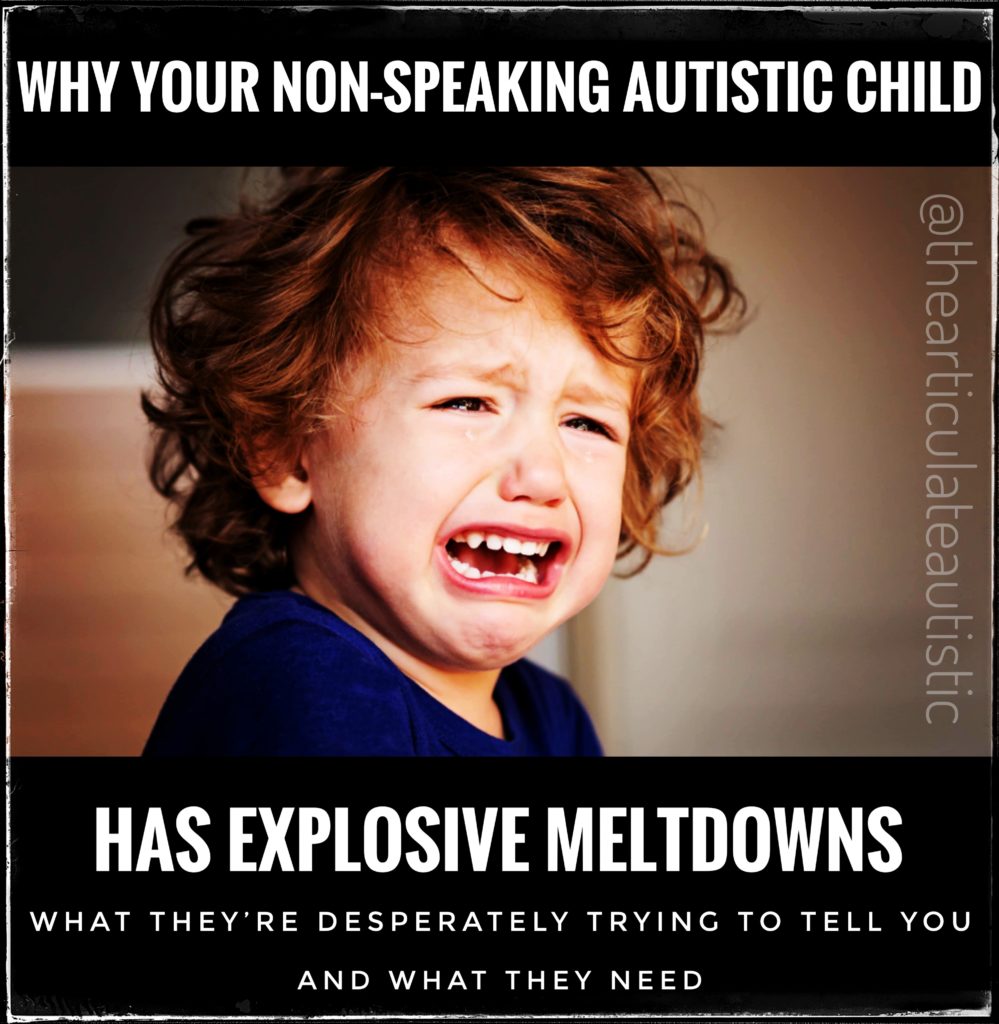Why Your Non-Speaking Autistic Child Has Explosive Meltdowns
What They’re Desperately Trying to Tell You and What They Need

When I wrote “My Autistic Child Makes Me Miserable” – The Google Search Results Series – Part 1, I thought I was helping bridge the gap between neurotypical parents and their autistic children, but for some, my explanations weren’t enough.
I received several comments from frazzled parents saying, “That’s nice, but what about my non-verbal child who screams, hits, bites, and destroys everything in the house on a daily basis?”
As a self-identifying and self-advocating adult autistic, I don’t face the same challenges as a non-speaking, high-support-needs autistic child. This is why I turned to other autistic adults on my Instagram page and asked them, directly, if they were considered “explosive” as children, and what they would have wanted their parents to know if they could have communicated their needs in a way the adults around them understood at that time.
I received a lot of helpful comments from the adult autistic community that I want to share with you in the form of this guide. However, if it would be easier for you to simply read the comments as is on my Instagram post, the link is here.
First, Let’s Talk About Trust

Before we dive in, let’s talk a bit about trust. An autistic child (or any child) who is screaming, kicking, biting, spitting, and self-harming doesn’t trust you. If that offends you, read it again, because it’s the cold, hard truth. Now, allow me to explain.
Your child not trusting you doesn’t mean you abuse or neglect them. A lot of times it’s because they don’t understand why you “won’t” protect them from a terrifying and overwhelming world and how you don’t even notice what they are experiencing every day. This isn’t your fault, this isn’t their fault. It’s a huge communication gap, but your child is too young to understand that and is reacting the only way they know how.
Also, if your child is hitting, biting, kicking, screaming, breaking things on purpose, etc., you don’t trust them. Fair enough. To you, their behavior is erratic and nonsensical. You may even be a bit afraid of them. Again, even though your behavior and way of moving in the world make perfect sense to you and the other neurotypical people around you, it doesn’t make sense to your child. It is just as strange and alien to them as our behavior is to you.
Another reason your child may not trust you that has nothing to do with abuse or neglect is that there are many, many things you may do or say in a day that erodes their trust (even if those things seem completely harmless to you).
For example:
- Micro-corrections
Neurodivergent children (especially those with ADHD and who are autistic) experience micro-corrections far more often than their neurotypical peers. Everything from the way an autistic child stands, moves their body, breathes, speaks, looks at others, eats, and plays are all “corrected” dozens of times a day.
“Sit up straight.” “Look me in the eye.” “Stop fidgeting.” “Stop flapping your hands.” “Stop doing that, people are staring!” “Stop covering your ears!” “Play with your toys normally, don’t line them up like that!”
I could go on for pages, but you get the idea. Imagine for a moment that your natural way of being in the world was constantly scrutinized and “corrected” day in and day out by everyone around you.
Wouldn’t that eventually make you want to hit someone? Wouldn’t it make you feel you couldn’t trust anyone?
- Not being taken seriously
Autistic people are sensitive. Even if you know next to nothing at all about autistic people, you know this. Yet, time and time again, a parent or teacher will tell an autistic child that the lights aren’t too bright or the music isn’t too loud or the tag isn’t that scratchy. When autistic children aren’t taken seriously when they express their needs, they may begin to lash out by shoving, biting, or other “explosive” behavior. Again, these are children experiencing torture in full view of their caregivers every day, and all they hear in response to it is some version of, “Stop being dramatic!”
- Not being allowed to be alone
Autistic children need time to be away from others to unmask, unwind, and experience total peace, yet parents, teachers, and other adults often don’t allow them to do this or guilt them into thinking it’s “rude” to not want to be around others all the time.
- Not being loved or supported equally
Oftentimes, an autistic child’s needs and emotions are not treated the same way as their neurotypical peers, and this often happens in front of the autistic child with siblings and cousins. Meaning, both children (neurotypical and autistic) can cry or be angry about roughly the same thing, but the neurotypical child is tended to while the autistic child is chastised.

- Being reacted to instead of understood
“Your last straw is our first clue.” I’ve said this one so many times. Many autistic children cannot read the facial expressions and body language the adults around them use BEFORE they lose their cool and blow up at them.
When they are being screamed at is the first and only time the autistic person realizes something is wrong, and they’re terrified because the yelling seems to “come out of nowhere”.
- Not being allowed to ask questions
Being told they are rude or stupid for asking questions is a common reason autistic children can get frustrated and lash out with explosive behavior and meltdowns.
- Not explaining social rules
Many autistic children (and adults) do not learn neurotypical social rules by being around neurotypical people, they learn by explicit instruction. Not explaining a social rule and then getting angry or punishing them for not knowing it feels like gaslighting and betrayal.
- Assuming malice as a first resort
Too often, parents of autistic children jump to reacting to something their child said or did as having malicious intent instead of fully investigating the situation and discovering their child’s intentions/perspective, which are often VERY different from what the behavior looks like from an outside perspective.
- Lack of emotional co-regulation
A parent who is already frazzled and unsupported may be unable to emotionally co-regulate with their child, which can lead to explosive meltdowns.
- Looking for hidden meaning behind literal communication
Autistic people, as a rule, speak literally. We say what we mean, and we mean what we say, and we don’t often even realize there are two or more ways to take something. Unfortunately, the neurotypical people around us often look for hidden meaning where there is none, and that can lead to mistrust and uncertainty.
Reflect on Why Your Child Doesn’t Trust You
Think about everything I’ve gone over in that last part, and think carefully, really reflect on which of these things you may have inadvertently done to lose your autistic child’s trust. This may be a painful and even anger-inducing part of the process, but it’s a necessary one.
How to Reduce Explosive Meltdowns
Now that you understand what you and the other adults may be inadvertently doing to trigger explosive meltdowns in your autistic child, let’s talk about what you can do to turn things around, improve communication, and re-establish trust.
Again, these tips have been taken directly from things autistic adults wished their parents had known when they were children.
- Radical Acceptance
In the post on Instagram, one person explained that, as a child, she could not handle making rushed decisions about her clothing choices. So, instead of forcing her to choose her outfits before leaving the house, her parents let her bring a few choices of clothes with her in a duffel bag to make the transition easier. It sounds so simple, but it saved her a LOT of meltdowns.
Radical acceptance means meeting your child exactly where they’re at and not trying to “correct” them into behaving more like a neurotypical child.
Does your child toe-walk? OK. Does your child stim? OK. Does your child have atypical facial expressions? OK. Does your child point at what they want instead of speaking? OK. (Get it for them.)
Accept it. The only time radical acceptance should not be used is if the child is in danger of harming themselves or others.
- Active Listening (Behavior, Gestures)
Even if your child is non-speaking, they will communicate with you through behaviors and gestures and/or their AAC. Practice active listening by being present and taking in what they’re communicating to you. Focus on what they’re feeling and expressing rather than how unusual their behavior or need seems to you. This establishes trust.

For example, let’s say your autistic child is having a full-out, tear-the-room-apart meltdown because they are missing their favorite sock.
Rather than tell them how ridiculous it is to react this way over a sock or trying to offer them a new one, comfort them like they have broken an arm because that’s how emotionally painful losing a comfort object can be for an autistic person!
Look for the sock with them, tell them you understand that their sock is important to them and that you know it hurts their heart and is making them feel anxious because they don’t have it.
Naming these emotions can also help them understand the feelings and sensations coursing through their bodies, as well, and can help them, over time, learn to recognize and regulate them.
- Time Alone
Another very common belated request I received in that comment section was time alone. Autistic adults wished their parents had understood how desperately they needed to be alone to unmask, unwind, play with their toys, play a video game, stim, read, punch a pillow, or just rock and cry.
Of course, if your child is in danger of hurting themselves or others, they should not be left alone, but you can remain in the room, seated (at their level if possible) and remain quiet or speak to them in a gentle, reassuring voice that they are safe, and it’s OK for them to be upset.
Also, during birthday and other holiday celebrations, allow your autistic child to go off and be alone to decompress from social interaction. It’s not rude, it’s necessary for our emotional survival.
- Protection and Advocacy
You protect your child from the big things, you fight for them in school to get their educational needs met, but what about protection from siblings, cousins, other family members, and neighborhood children?
If your child is non-speaking, they may be being bullied, left out, or their sensory sensitivities purposefully triggered by other children in the family or the neighborhood because that’s what some neurotypical children do to someone different when parents are nowhere in sight.
Is your child being mistreated in some way that you’re not aware of? Are they especially explosive when they come home from the next-door neighbor’s or their cousin’s house?
Some NT children will go out of their way to trigger a meltdown in an autistic child, and when that child has one, and it includes hitting or kicking the perpetrator, the autistic child is usually the one who gets in trouble because they are “losing it” while the NT child is calm.
Watch out for these hidden meltdown triggers.
- Equal Love and Support
One person said that even though both she and her cousins cried over what adults would consider “minor things”, her cousins were held and comforted and asked what was wrong, but when she cried, she was told to stop crying or else, get over it, or asked what did she do? This difference in treatment never made any sense to her, and even as an adult, she still has no answers. I went through the same thing as a child. I didn’t think I was doing anything different, but I WAS different and was, therefore, treated as such. Check in with yourself to make sure you’re not accidentally doing this with your child.
- Asking Instead of Reacting
Another common theme that came up in the Instagram discussion was asking instead of reacting. Autistic adults wished their parents had asked them questions such as, “Why are you so angry?” “What happened?” and actually listened to and validated their feelings when they expressed them.
Instead, these adults said that their parents jumped almost immediately to accusations, scolding, and punishment.

- Explicit Explanations
Explicit explanations are essential to autistic learning, and many autistic adults expressed their unmet need for them when they were children.
While neurotypical children pick up on what’s expected of them socially by simply being with other neurotypical children, autistic children usually do not. They need to be explicitly taught in clear, concise language.
Even if the social rule is “obvious” to you, it isn’t to your autistic child, so when you yell at them or punish them for breaking a rule they didn’t know existed, they learn not to trust you.
If you want your autistic child to learn something, you must teach them explicitly, not simply “expose” them to it.
- Assume Unawareness Before Malice
This is another big one. So many times, throughout my posts, autistic adults have commented on how malice was always the first assumption whenever they would get into trouble as children. Still, to this day, they have no idea what they did wrong, and nobody would explain.
One autistic adult commented that they were in a horse jumping competition as a child and that she and the horse jumped the first half of an obstacle, but the horse refused to jump the second. As a child, the autistic adult went back around and had her horse jump only the one it missed (the second obstacle) and she and her horse were disqualified!
Apparently, if a horse missed an obstacle during a jump, the entire obstacle needed to be done over, not just the second one.
It broke her heart because she didn’t know these basics, but she was expected to!
Again, while a neurotypical child might have “picked up on” the basics by being in these types of competitions in the past, most autistic people must be explicitly taught the rules about everything from socializing to games because we don’t pick them up from our environment.
- Teach Emotional Regulation
Do you want to know how old I was when I learned that regulating my emotions was even an OPTION? That it was even a THING? I was 36! It literally took a nervous breakdown and enrolling in dialectical behavior therapy (DBT) classes for me to learn that emotions weren’t something that just HAPPENED to people.
Do you have any idea how heartbreaking it was for me to learn something in my mid-thirties that I should have known as a 5-year-old? And I’m by FAR the only one. Many autistic adults have expressed their wish to learn how to understand and regulate their emotions.
If your child has difficulty understanding, coping with, and expressing their emotions in a healthy way, there are tons of books, videos, and other resources for you both to learn how to do that NOW, not when they’re on a collision course with middle age!
- Take Communication Literally
For the semi-speaking or situationally mute autistic child, be careful not to “tone police” when they do speak. Many autistic people speak in a monotone or have an otherwise “socially inappropriate” tone when speaking, and the neurotypical people around them pay more attention to these tone differences rather than our literal words.
Whether your autistic child speaks slowly, quietly, loudly, stutters, or speaks in a monotone, pay attention to and respond only to the literal words being spoken; nothing else.
Don’t admonish and don’t correct. Also, don’t laugh if their voice, seriousness, or use of large vocabulary words sounds funny to you. This just makes them feel like they are being laughed at and not taken seriously.
Furthermore, don’t look for hidden meaning in words or tone as there usually is none.
Listen, take what is said literally, and meet the need. This establishes trust.
The Takeaway
In the end, everything comes back to trust. Does your child trust you? Do you trust your child? These tips should help you and your child come to a place of understanding so explosive meltdowns are less frequent, your child feels safe and understood, and you feel more at ease and comfortable in your role as their parent, protector, and guide in this world.




Love this. Knew a lot already, but it always helps to be reminded.
This stuff can’t be easy for any party. Sometimes it might hurt to read these things. Just because their isn’t trust doesn’t mean there isn’t love.
The more you know, the better.
Thank you. I really appreciate your comment. 🙂
Thank you for this. You are doing important work.
Thank you. I mean to help as many people as I can.
the whole premise starts off with a lie and builds from there. I never had explosive meltdowns because I didn’t trust my mom or her help. I threw them because everything was overwhelming and I couldn’t control my fight/flight. sensory issues build up, but it’s hard to even articulate how that feels as an adult, let alone a child. imagine describing a bush to a blind person or a symphony to a deaf person. sometimes everything builds up until it explodes out. that’s literally all there was to it. Stop Parent Blaming, it had nothing to do with my mom. i would do it whether she was my mom or anyone else on the plant was my mom, even u lady.
This explanation also makes sense. I have not really had a meltdown in my life, but I have engaged in some self-injurious behavior (like hitting myself) when emotionally overwhelmed, and I think my sensor sensitivities are mild compared to most autistic people’s. If I were that overwhelmed I’d freak out too.
What’s frustrating to me about this entire topic can be summarised thusly:
•The problems autistic people face are shared by people who are not autistic. Sensitivity is a moot point, but not unimportant – humans are sensitive, to varying degrees. For, possibly, the first time on a global scale, there are communities of people prioritizing the making of safe places for all humans – this is all-inclusive: of the 9 billion people on Earth, we have the, dare I say, optimistic hubris to aim for fostering a culture that embraces each unique expression of the human experience. My frustration stem from this simple realization: these impossible standards and expectations we are torturing ourselves with are natural consequences of a culture so inwardly-focused, individualistically minded and isolated that we are enmeshed in it. Do you understand me? This is an honest question, because to see these sorts of global tapestries being woven in real-time, you must understand that there is a lot wrong with our entire species’ unseen environment – we are poisoning our environments from the roots to the air; from the psyche to the body and beyond. As well meaning as your post is, as necessary as a function your job is to write specialized and highly dubious articles on nuanced topics in return for a monetary incentive, I don’t see your (or anyone’s) advice and guidance as the supreme salve to this highly relevant issue of diverse humans coexisting. The material aspects of our existence as humans has been fetishized so extremely and potently that we cannot discern how deep we are into this mess of issues. 50 years ago we tollerated autism as “mentally r♡♡♡♡ded”, less than 50 years before that, autism was a death sentence. If we conceptualize that historical fact in a more tangible way that emphasizes my point, if the aforementioned events in time were explosive blasts, the soundwaves are only just beginning to reach our ears. These sorts of major greivences we perpetrate again and again to our own kind possess substantial karma that reverberates through time. Whether we outlive their echos is perhaps the apex of the anthropocene threshold we find ourselves at.
If it suits you, you can feel free to continue telling yourself that diversity can exist in the cage of modernity. Eventually, however, I think that we will either slowly (if individually focused), or abruptly (if globally minded), have to face these problems for the weaknesses they highlight: our limitations as a culture.
What I am trying to express is that reduction of your essence to “autistic” is sad. To me, it’s like the story of the ugly duckling… Tragic And then an entire article on how to “manage” your reduction is what makes the tragedy a comedy. Wow! What a show. What a play. What a story. Incredible.
Sure, I don’t really even have to post my comment or have my “voice” heard, granted… And in another lifetime I probably would have already deleted my writings after the shame and guilt I felt at pulling back the curtain on an anti-human, self-destruction conspiracy (aka. Approx. 2020 CE).
My emotions and thoughts are on display: how lucky I am to have nurtured a fondness for written transmission of information. One might even call me autistic, if so inclined. I just call it successful. Pleasure. Satisfaction. A numinous-esque quality that I’ve always felt drawn to. Despite the fact it might not add any value to anyone else’s life or experience.
Do you understand? I understand you, but I just don’t want to believe that you’re right, or you are the be all, end all. I take your point, and respect it for what it is worth as an expression of your own experience in some capacity. Knowing this, what are your thoughts having read this?